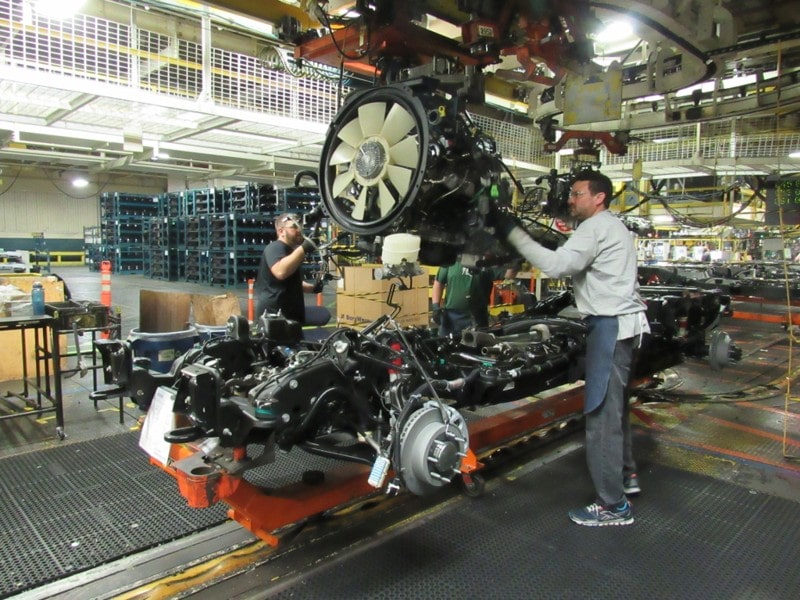
Diesel Engines: Advantages and Disadvantages
Diesel engine is a kind of internal combustion engine that employs a technology that makes it very efficient. This engine uses the increase in temperature produced by compressing a gas so …
Diesel engine is a kind of internal combustion engine that employs a technology that makes it very efficient. This engine uses the increase in temperature produced by compressing a gas so that the fuel is spontaneously ignited by injecting it into the combustion chamber. A cycle that was precisely invented by Rudolph Diesel, hence its name.
The operation of this cycle is very simple. In the diesel engine, a large amount of air is introduced into the cylinder, which is compressed 14 to 18 times by the piston. When the piston is at the top, the fuel is injected and burnt as it enters the combustion chamber.
The engine of a diesel car or any other vehicle that owns it has a number of advantages and disadvantages that we will see below. Taking them into account is extremely important if we are in the position to buy a car. A good choice can depend on a significant savings.
Advantages of a Diesel Engine
The advantages of the diesel engine have led it to be the main competitor today of the gasoline engine.
Its main advantage lies in the fact that it is an engine of great durability. This is because its combustion process is by air compression, not from the mixture of gasoline and air from gasoline engines. In this way, the interior parts will suffer less wear and have a much longer service life.
Another great advantage is that today’s diesel engines are among the cleanest ever produced. Not in vain, they produce on average less CO2 than gasoline engines. In addition, since 2006 they incorporate a particle filter that removes almost all particles from exhaust gases.
On the other hand, if there is one thing that characterizes the engine of a diesel car is its reliability. Without going any further, it is the engine that is usually used to equip heavy machinery. In addition, it is an engine that does not have spark plugs, cables, rotors or other elements, so it is much simpler than gasoline.
At the same time, if we take into account that diesel has a higher density than gasoline, this engine can run more than twice as far as a gasoline engine with the same amount of fuel. This will affect our economy, since we will be able to save up to 30% of consumption with a diesel car.
This makes us think that a diesel car is ideal for longer journeys and more difficult terrain. If we have a vehicle of this type to travel or work is very likely to save a good amount of money on fuel.
It should also be noted that the diesel engine generates very low revolutions, so it will have greater effectiveness and ability to load or drag. This is why we commented earlier that diesel engines have always been used for the heaviest machinery.

Disadvantages of a Diesel Engine
If we have to talk about the main disadvantage of a diesel engine, this is its price. Although in recent years the current market tends to cheaper diesel cars, the truth is that they are still more expensive than gasoline. In this sense, each user must assess whether it is worth the higher cost for a car of this type depending on what you are going to use.
However, if we do many kilometres at the end of the year with the car it is very likely that we can compensate a higher price with a lower expenditure on fuel.
From an economic point of view, it should also be remembered that both the MOT and the price of compulsory insurance are usually higher in diesel engines than in petrol engines.
On the other hand, it should also be noted that the diesel engine often requires more maintenance than a petrol engine. The owners of a diesel car will have to carry out periodic revisions of their engine in order not to have great problems with time.
Added to this is the fact that diesel engine repairs are often more expensive. It is true that the technology used today by these engines has significantly reduced the risk of breakdowns. But when they do occur, they are probably more expensive than those of a gasoline engine.
Among the main problems that diesel engines can have, special attention must be paid to water and the presence of micro-particles. It will also be necessary to carry out a greater number of revisions for the changes of filters, the oil, etc.
At the same time, the diesel engine is slower than the petrol engine. At this point, it is necessary to mention again the new technologies of these engines, which are managing to provide them with greater power. However, they are not yet fully matched with petrol engines, also because they have a higher weight.
Finally, it should be mentioned that diesel engines are still noisier than petrol engines.
In short, to value between a diesel car or not can depend on multiple factors. To have a vehicle with an engine of this type can be very interesting if we plan to travel frequently and do many miles. In this way, the initial investment will be compensated with fuel savings and the greater durability of the engine.
However, if we are only going to use the car to keep it in the city, make purchases and, in general, we are not going to do many kilometers with it the best thing is going to be to opt for a gasoline engine. The difference from an economic point of view is going to be more than important.






